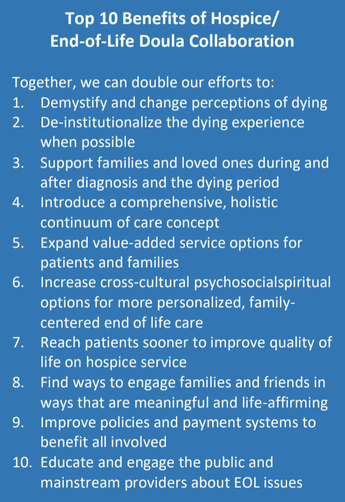What is a doula?
"Doula" is a Greek word for "a woman who serves." A doula is a non-medical person trained to give physical, emotional, and spiritual support to the dying and their loved ones.
What is a death doula?
A death doula, also called a certified end-of-life doula (CEOLD), is traditionally a companion to someone who is at end-of-life and their loved ones. The professional role of the death doula is a newly emerging field. However, the art of caring for dying loved ones is an ancient tradition and a sacred practice. Doulas serve as a supportive presence to the dying and loved ones of the dying. Just as a birth doula helps guide the birthing process, a death doula helps support and guide the dying process.
What do doulas do?
|
The doula serves as a resource for the patient and family and also provides spiritual, emotional, and physical support. Doulas can help organize documents that indicate your wishes at end-of-life.
Spiritual:
|
hospice & doulas work in tandem
|
How is a death doula different from hospice?
Doulas compliment the beautiful care and services provided by hospice. The primary role of hospice is to plan medical care and provide clinical care for terminally ill patients. Traditional death doulas provide non-medical care and help reinforce and support the plan outlined by hospice. The doula serves as the eyes and ears for the hospice team and can help alert the team to physical changes or symptom management needs.
Hospice services are often restricted by time and reimbursement constraints, leaving limited time at the bedside. Often families choose to work with a doula to help supplement support and care when hospice isn't available. Doulas serve to bridge the gap between hospice and end-of-life.
Hospice services are often restricted by time and reimbursement constraints, leaving limited time at the bedside. Often families choose to work with a doula to help supplement support and care when hospice isn't available. Doulas serve to bridge the gap between hospice and end-of-life.
Who needs a death doula?
Anyone who is going to die can benefit from working with a death doula. So, everyone.
It is never too soon to start working with a doula, thinking about how you want your death to look (who will be there, where will you die, etc.), and getting end-of-life documents in order.
The sudden illness or decline of a family member can cause chaos within a family unit quickly. All too often grieving loved ones are faced with the burden and stress of making tough decisions after a death in the family. Preparing end-of-life documents, pre-organizing funeral arrangements, creating legacy projects, and getting clear on your wishes can help make the end-of-life journey a time of reflection and celebration instead of chaos, stress, and question.
It is never too soon to start working with a doula, thinking about how you want your death to look (who will be there, where will you die, etc.), and getting end-of-life documents in order.
The sudden illness or decline of a family member can cause chaos within a family unit quickly. All too often grieving loved ones are faced with the burden and stress of making tough decisions after a death in the family. Preparing end-of-life documents, pre-organizing funeral arrangements, creating legacy projects, and getting clear on your wishes can help make the end-of-life journey a time of reflection and celebration instead of chaos, stress, and question.
What makes Liz different than other death doulas?
A death doula is traditionally a non-medical person who gives support physically, emotionally, and spiritually to someone who is dying (they do not provide hands-on care such as bathing, toileting, and feeding).
As a registered nurse, Liz's services includes a blend of end-of-life spiritual and emotional support, with bedside nursing care, if needed. She can provide medication administration, wound care and other hands-on skills that are outside the scope of practice for traditional doulas. Liz specializes in coaching and support for those who choose to VSED at end-of-life.
As a registered nurse, Liz's services includes a blend of end-of-life spiritual and emotional support, with bedside nursing care, if needed. She can provide medication administration, wound care and other hands-on skills that are outside the scope of practice for traditional doulas. Liz specializes in coaching and support for those who choose to VSED at end-of-life.
Isn't your job depressing?
Being a death doula isn't a job, this is how we serve others. That being said, this work is deeply rewarding. Death can seem dark, scary, and ominous. Part of Liz's mission is to help shift the stigma surrounding death as being taboo, to being part of everyday conversation. In our collective culture, death is feared. We're working to change that.
We are all going to die, why not die well?
We are all going to die, why not die well?
"Death is not a morbid thought. Death is the greatest teacher in all of life."
-Michael Singer, The Untethered Soul
You don't have to do this alone.
Copyright 2021 Death Doula Nurse LLC
Proudly powered by Weebly


